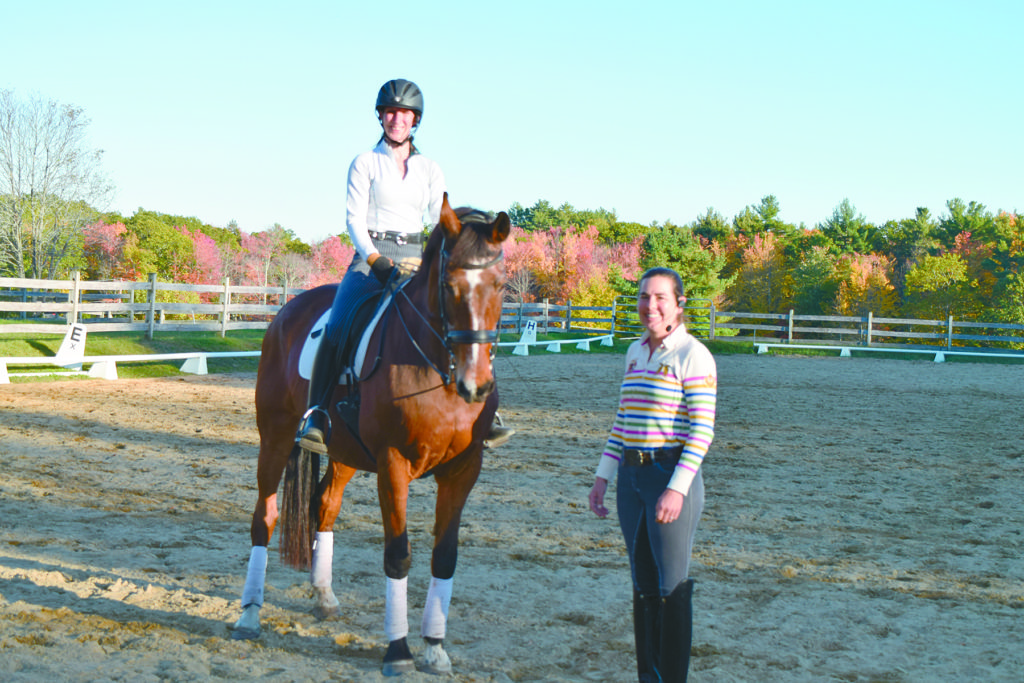Tanya Rennie spoke into a headset in brief, even phrasings. “Shoulders down. Left hind, right shoulder. Haunches in. Good. Stay supple. Good.” The rider and horse made adjustments as they moved in controlled conjunction around the indoor arena. The spacious arena simultaneously hosted another team receiving similar instruction from trainer Amy Libby.
This is routine activity at Gorham’s Vienna Farm, which occupies nearly eighty picturesque acres at the corner of Fort Hill and Spiller Roads. Rennie and her husband, Jim Jaeger, have owned the farm since 1984, with growth in both property and structures since then.
The foundation of their enterprise and lifestyle is horses. Their website states, “While the cornerstone of Vienna Farm’s services is horseback riding in our lesson program, and the training of Dressage horses, we are many things to a wide variety of clients. Equestrian center, riding academy, boarding stable, and horse farm are some of the terms that have been used to describe Vienna Farm.”

Gorham resident Maggie Ray in the saddle, with trainer Amy Libby. Ray has been connected to the farm for years and participated in the working student program while growing up.
While they’ve produced serious and successful competitors, including two recent young riders who qualified for the only international dressage competition held in the United States, it didn’t take long to understand the scope and purpose runs broader and deeper than grooming for competition.
With engaging enthusiasm, Jaeger began a discourse on the history of dressage which reaches back to the ancient Greeks. He described the military use of cavalry, and defined dressage in its origins as “to train” or “to school” via keen observation of wild horses and their movements, striving to make horse and rider most effective in battle. Dressage evolved and centuries ago became a sport whose goal is to have the horse under saddle move as if in its natural, free state.
It’s worthy to note that the variety of Olympic equestrian events are mixed gender. Jaeger mentioned the renowned, historic Spanish Riding School of Vienna, Austria, and the Lipizzan breed of horses whose origins are credited to the Hapsburg nobility, and are known for classical dressage performance. Although one would suspect that Vienna Farm was named after this, Jaeger confirmed it came from a favorite Billy Joel tune.
Jaeger didn’t grow up around horses, like Rennie did. Since the late 1990s, however, he’s been working alongside her full time
at the farm. There’s a lot of work, with about twenty-four horses currently in the stable, many owned by the farm, others by some students and general boarders.
In addition to Joe Hannaford, who wears many hats, and trainer Amy Libby, sisters Chrissy and Nancy Smith of Gorham are also employees, and have been connected to the farm for nearly twenty years.
As young riders they participated in the working student program, which typically includes 8-10 participants, and helps defray costs. Libby has been riding since age five, and has been at Vienna Farm since she was twelve, a 25-year tenure.
Vienna Farm hosts clinics and competitions that attract people from wide distances. Jaeger walked the outskirts of the property and pointed out the trail network, while Rennie displayed continuing dedicated attention to students. Both want people to visit and enjoy the beautiful space. Of riding, Jaeger said, “It’s a great physical pastime for people. You can always get better. There is the emotional aspect of connecting with another living being. Horses are very social animals. You can take up riding in the same way people take up tennis or golf.”
First paragraph refrain: “We are many things to a wide variety of clients.” For more information, visit www.viennafarm.com.


